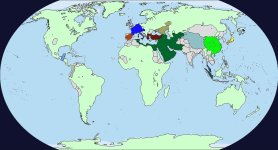raharris1973
Well-known member
"O Lord, Deliver us from the fury of the Northmen" - so wrote, or was quoted, a survivor of the Viking raid on the English Monastery of Lindisfarne in 796 AD,
In this ATL, that prayer is answered, by Charlie the ASB, who teleports the demographic center of Norse-speaking southern Scandinavia, the homeland of the Viking raiders, far away from defenseless England, and Europe, a world away, to the Pacific Ocean, east of the Kuril islands. Left behind, attached to the European landmass are the further north, Arctic and sub-Arctic lands populated by forest-dwelling and reindeer herding Finnish and Lappish (or Sami) peoples, lacking in longboat technology and formidable raiding tactics.
Here is how it looks:
The various North Germanic Norse peoples, predecessors of the Danes, Norwegians, Swedes, and others related like Geats, are displaced far, far to the east, to the northern Pacific, and a bit south of their original latitude, to not run into Kamchatka or Chuckchi peninsulas or the Aleutians and have a temperature somewhat closer to home...although this is still a cooling experience for them. With their movement south several degrees latitude to align with the Kurils and Hokkaido, I also shrank the southern Scandinavia footprint 85% to adjust for Mercator projection distortions.
What do the Scandinavians do in their literally (cool) northeast Asian location, with the closest settled people being the Japanese? How do the two societies interact? How far do the Norsemen take their ships in all directions?
And how is the development of Europe changed by the sudden absence, starting in 800 AD, of the Scandinavian Norsemen and Viking raiders. None of the Viking raiders or founders of Dublin, the Danelaw, Normandy nor the Normans, Novgorod, Kiev, nor the Varangian guard. How are the histories in particular of the British Isles, France, Germany, Italy, and Russia effected? What becomes the first large notable dynasty or state structure ruling over the East Slavs of the Dnieper or Volga rivers?
And, does the absence of Norsemen basically "cure" the North Sea and Baltic of piracy? Or do formidable Slavic or Baltic pirates take up the mantle and become new alt-Vikings? Presuming not, does a lack of pervasive and unpredictable threats of piracy, raids and conquests from the sea leave the early medieval central kingdoms with more prestige, power and authority over their subjects, leading to less feudal fragmentation than we saw in OTL as people sought more reliable, local protection in northwestern Europe?
Your thoughts?
In this ATL, that prayer is answered, by Charlie the ASB, who teleports the demographic center of Norse-speaking southern Scandinavia, the homeland of the Viking raiders, far away from defenseless England, and Europe, a world away, to the Pacific Ocean, east of the Kuril islands. Left behind, attached to the European landmass are the further north, Arctic and sub-Arctic lands populated by forest-dwelling and reindeer herding Finnish and Lappish (or Sami) peoples, lacking in longboat technology and formidable raiding tactics.
Here is how it looks:

The various North Germanic Norse peoples, predecessors of the Danes, Norwegians, Swedes, and others related like Geats, are displaced far, far to the east, to the northern Pacific, and a bit south of their original latitude, to not run into Kamchatka or Chuckchi peninsulas or the Aleutians and have a temperature somewhat closer to home...although this is still a cooling experience for them. With their movement south several degrees latitude to align with the Kurils and Hokkaido, I also shrank the southern Scandinavia footprint 85% to adjust for Mercator projection distortions.
What do the Scandinavians do in their literally (cool) northeast Asian location, with the closest settled people being the Japanese? How do the two societies interact? How far do the Norsemen take their ships in all directions?
And how is the development of Europe changed by the sudden absence, starting in 800 AD, of the Scandinavian Norsemen and Viking raiders. None of the Viking raiders or founders of Dublin, the Danelaw, Normandy nor the Normans, Novgorod, Kiev, nor the Varangian guard. How are the histories in particular of the British Isles, France, Germany, Italy, and Russia effected? What becomes the first large notable dynasty or state structure ruling over the East Slavs of the Dnieper or Volga rivers?
And, does the absence of Norsemen basically "cure" the North Sea and Baltic of piracy? Or do formidable Slavic or Baltic pirates take up the mantle and become new alt-Vikings? Presuming not, does a lack of pervasive and unpredictable threats of piracy, raids and conquests from the sea leave the early medieval central kingdoms with more prestige, power and authority over their subjects, leading to less feudal fragmentation than we saw in OTL as people sought more reliable, local protection in northwestern Europe?
Your thoughts?


